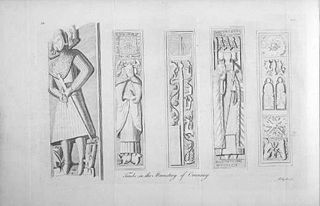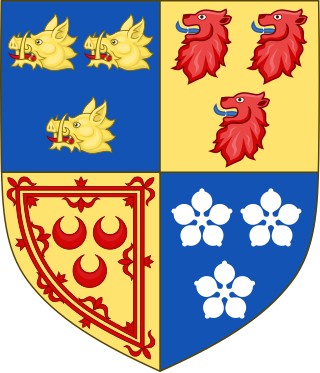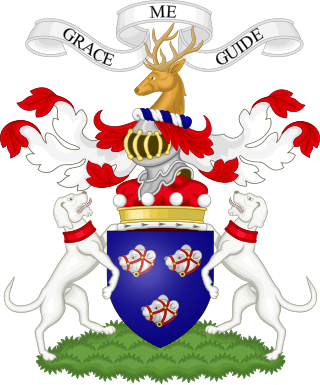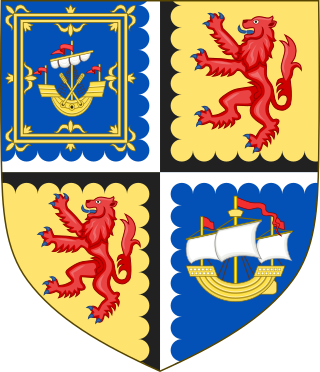Related Research Articles
William Sinclair (1410–1480), 1st Earl of Caithness (1455–1476), last Earl (Jarl) of Orkney, 2nd Lord Sinclair and 11th Baron of Roslin was a Norwegian and Scottish nobleman and the builder of Rosslyn Chapel, in Midlothian.

Lord Lovat is a title of the rank Lord of Parliament in the Peerage of Scotland. It was created in 1458 for Hugh Fraser by summoning him to the Scottish Parliament as Lord Fraser of Lovat, although the holder is referred to simply as Lord Lovat. It was a separate title from the Scottish feudal lordship of Lovat, already held by the highland Frasers. In 1837 they were created a third title, Baron Lovat, of Lovat in the County of Inverness, in the Peerage of the United Kingdom. The holder is separately and independently the Chief of the highland Clan Fraser of Lovat.
The Earl or Mormaer of Ross was the ruler of the province of Ross in northern Scotland.

Clan MacDonell of Glengarry, also known as Clan Ranald of Knoydart & Glengarry is a Highland Scottish clan and is a branch of the larger Clan Donald. The clan takes its name from River Garry where the river Garry runs eastwards through Loch Garry to join the Great Glen about 16 miles (25 km) north of Fort William, Highland. The progenitor of the MacDonells of Glengarry is Reginald, 4th great-grandson of the warrior Somerled. The clan chief is traditionally designated as the "Son of Alexander's son".

Clan Sutherland also known as House of Sutherland is a Highland Scottish clan whose traditional territory is the shire of Sutherland in the far north of Scotland. The chief of the clan was also the powerful Earl of Sutherland; however, in the early 16th century, this title passed through marriage to a younger son of the chief of Clan Gordon. The current chief is Alistair Sutherland, who holds the title Earl of Sutherland.

Clan Sinclair is a Highland Scottish clan which holds the lands of Caithness, the Orkney Islands, and the Lothians. The chiefs of the clan were the Barons of Roslin and later the Earls of Orkney and Earls of Caithness.

John of Islay was the lord of the Isles (1336–1386) and chief of Clan Donald. In 1336, he styled himself Dominus Insularum, although this was not the first ever recorded instance of the title in use. Some modern historians nevertheless count John as the first of the later medieval lords of the Isles, although this rather broad Latin style corresponds roughly with the older Gaelic title Rí Innse Gall, in use since the Viking Age. For instance, the even more similar Latin title dominus de Inchegal, applied to Raghnall Mac Somhairle in the mid-12th century. In fact John is actually styled Rí Innsi Gall or King of the Isles shortly after his death in a contemporary entry in the Irish Annals of Ulster. Clan Donald considers the title "Lord of the Isles" to have been in use at least since Angus Mor Macdonald, who died in 1293, and the title "King of the Isles" in use since Somerled, the Norse-Gael who forged the Kingdom of the Isles in the 12th century.

Clan Oliphant is a Highland Scottish clan.

Alexander Seton, 1st Earl of Huntly, who adopted the family name of Gordon from about 1457, was a powerful 15th-century Scottish magnate. He was knighted in 1439/1440 and was Lord of Badenoch, Gordon, Strathbogie and Cluny.
George Gordon, 2nd Earl of Huntly was a Scottish nobleman and Chancellor of Scotland from 1498 to 1501.

Clan Forbes is a Highland Scottish clan from Aberdeenshire, Scotland.

William Sinclair was a Scottish nobleman, the 2nd Earl of Caithness and chief of the Clan Sinclair, a Scottish clan of the Scottish Highlands.
John Mor MacDonald, fl. 1499, was third lord of Clan Donald.

The Lord of Lochaber was a title in the peerage of Scotland.

Sir Edward Keith was a Scottish nobleman and hereditary 11th Marischal of Scotland.
Elizabeth Gordon, Heiress of Gordon, Scottish baroness and progenitress of the Gordon Earls and Marquesses of Huntly.
Alexander Seton, Lord Gordon was a Scottish baron, Lord of Parliament and progenitor of the Gordon Earls and Marquesses of Huntly.

The Alexanders of Menstrie, also known as the House of Alexander, are a sept of Clan MacAlister of Scotland. The family is said to descend from Somerled, Lord of the Isles. The seat of the clan was at Menstrie Castle in Menstrie, Clackmannanshire. Descendants of the Alexanders of Menstrie have become prominent in Ireland, England and the United States.

Alexander Sutherland, 3rd of Duffus was a Scottish member of the nobility and a cadet of the Clan Sutherland.
References
- ↑ "The Family Tree of the Lords of the Isles - Finlaggan Trust". Archived from the original on 4 July 2010. Retrieved 16 February 2012.
- Paul, James Balfour; Douglas of Glenbervie, Robert; Wood, John Philip (1904), The Scots peerage : founded on Wood's edition of Sir Robert Douglas's Peerage of Scotland : containing an historical and genealogical account of the nobility of that kingdom / edited by Sir James Balfour Paul, David Douglas